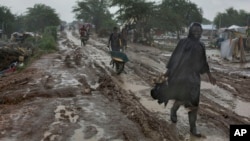World Food Program (WFP) executive director Ertharin Cousin says food insecurity in Malakal, South Sudan is increasing as over a million homeless have fled the violence.
After an inspection of the northeastern town which once had a population of about 140,000, Cousin said, “What we saw in Malakal was a ghost town, a city where all of the residents have abandoned their homes because of the threat of violence and are now living either in the U.N. facility, or they are walking trying to find assistance, many of them in neighboring countries.”
Abandoned on the banks of the White Nile
Cousin said many who are not in internally displaced persons’ camps are living in the bush with no access to food or water.
“Imagine this,” she said of this abandoned town on the banks of the White Nile. “Many of them are living in walking distance from what was their home. And now they are living in a tent in a U.N. facility with no access to food other than what we are providing.”
Major relief agencies such as WFP, UNICEF and Doctors Without Borders depend completely on donor contributions throughout the conflict period. Cousin said the international community is responding, but food insecurity continues to heighten and is very worrying.
Cousin and UNICEF executive director Tony Lake took this Malakal trip to assess refugee conditions in remote areas where there are no U.N. camps.
“We have a team that is going out and working to meet the needs of food assistance of people who are in the bush who otherwise are depending on eating the wild roots and drinking water from the Nile,” she said.
Somalia, Central African Republic, Chad and Cameroon
Cousin listed other Africa regions with food security problems, such as the escalating challenges in Somalia, a region that is experiencing a drought.
“We are committed to trying to reach as many people as possible in Somalia,” she said.
But, Cousin said WFP has limited access to that area because of the threat of the Islamist militants of al-Shabab.
Seven months of fighting in the Central African Republic has made access to areas outside of Bangui difficult to reach to provide people in need with food assistance. Many people are fleeing their homes there and are pouring into nearby neighbors Chad and Cameroon where the WFP is providing assistance.
“It’s a very very challenging time in the humanitarian response community because we have an unprecedented number of ongoing man-made conflicts where the victims of those conflicts do not have regular access to food,” said Cousin.
She also mentioned food challenges in conflicts in Nigeria and Mali that are affecting populations and are forcing people to move from their homes, leaving them with no access to food.
“While simultaneously you have the challenges of climate-impacted food insecurity in Somalia, we are now watching western Africa - in Liberia and Sierra Leone where not only do you have the challenges of flooding in those areas, but you also have the challenge of Ebola,” said Cousin.




